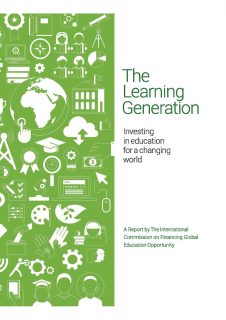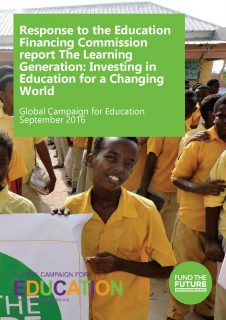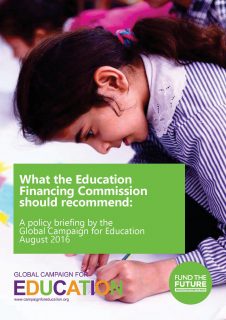19-09-2016 | Op 18 september presenteerde de Education Commission haar rapport: ‘The Learning Generation: Investing in Education for a Changing World’. GCE is blij met dit stevige pleidooi voor meer investeringen in onderwijs, maar stelt dat de aanbevelingen scherper hadden gekund.
In een reactie schrijft GCE-Internationaal blij te zijn dat de International Commission on Financing Global Education Opportunity enkele belangrijke vraagstukken rond de financiering van onderwijs aankaart. En dat het rapport laat zien dat het recht op onderwijs voor iedereen haalbaar is, mits de internationale gemeenschap zich daar voldoende voor inspant.
Maar juist omdat de investeringen in onderwijs zo tekort schieten, zijn scherpere aanbevelingen nodig, stelt GCE-Internationaal. Zodat er geen ruimte is voor misverstanden. Zo had de Commissie zich er duidelijker over kunnen uitspreken dat gratis en goed onderwijs allereerst de verantwoordelijkheid is van overheden, en minder ruimte kunnen laten voor het subsidiëren van privaat onderwijs. Onderwijs door private partijen kan slechts onder bepaalde voorwaarden een aanvulling zijn op openbare voorzieningen.
Ook had het pleidooi voor meer investeringen in onderwijs krachtiger kunnen zijn door beter aan te sluiten op al bestaande structuren, zoals de SDG4-Education 2030 Stuurgroep en de speciale VN-rapporteur voor het Recht op Onderwijs.
Lees meer
♦ Het persbericht van GCE-Internationaal
♦ De reactie van het Global Partnership for Education
♦ Het nieuwsbericht ’10 Aanbevelingen van GCE voor de Education Commission’
♦ De website van de Education Commission
♦ De consultatie door GCE-NL
♦ De Global Action Week for Education 2016 over Financiering van onderwijs
Education Commission | The Learning Generation: Investing in Education for a Changing World
 The world today is facing a global learning crisis. If current trends continue, by 2030 – the date the international community has set for attaining quality secondary education for all – less than 10 percent of young people in low-income countries will be on track to gain basic secondary level skills. The costs of this learning crisis – unemployment, poverty, inequality and instability – could undermine the very fabric of our economies and societies.
The world today is facing a global learning crisis. If current trends continue, by 2030 – the date the international community has set for attaining quality secondary education for all – less than 10 percent of young people in low-income countries will be on track to gain basic secondary level skills. The costs of this learning crisis – unemployment, poverty, inequality and instability – could undermine the very fabric of our economies and societies.
But there is a better vision for the future of global education and young people. Indeed, it is possible to ensure that all children and youth are in school and learning the skills they need to be successful in work and life. Based on research from the Education Commission, this vision is achievable within a generation if all countries accelerate their progress to that of the world’s top 25 percent fastest improvers in education. This report proposes the largest expansion of educational opportunity in history and outlines the reforms and increased financial investment required to achieve it.
Download the full report | Download the executive summary | Explore the report online
GCE | Response to the Education Financing Commission report
 The International Commission on Financing Global Education Opportunity has picked up on some important issues and is a positive contribution in showing that the education goals are achievable. It could have been sharper and bolder in some areas and there are some missed opportunities in ensuring the future financing of education is truly long term and predictable. In some cases it wants to have its cake and eat it, side-stepping sensitive or difficult issues rather than providing a clear direction. This could leave too much scope for different interpretations of its recommendations. The Commission should have been much more explicit in calling for public money to be spent only on the central challenge and obligation of adequately funding free, quality public education – rather than in subsidising for-profit providers. Whilst there is a need to maintain political momentum there are concerns about the creation of new architecture to do this – rather than reinforcing what was agreed just last year (following a long consultation process). However there is clearly much to be welcomed overall, not least the positive tone that emphasises that dramatic progress on education is achievable if leaders are held to account and if adequate financing is raised and effectively used.
The International Commission on Financing Global Education Opportunity has picked up on some important issues and is a positive contribution in showing that the education goals are achievable. It could have been sharper and bolder in some areas and there are some missed opportunities in ensuring the future financing of education is truly long term and predictable. In some cases it wants to have its cake and eat it, side-stepping sensitive or difficult issues rather than providing a clear direction. This could leave too much scope for different interpretations of its recommendations. The Commission should have been much more explicit in calling for public money to be spent only on the central challenge and obligation of adequately funding free, quality public education – rather than in subsidising for-profit providers. Whilst there is a need to maintain political momentum there are concerns about the creation of new architecture to do this – rather than reinforcing what was agreed just last year (following a long consultation process). However there is clearly much to be welcomed overall, not least the positive tone that emphasises that dramatic progress on education is achievable if leaders are held to account and if adequate financing is raised and effectively used.
GCE | What the Education Financing Commission should recommend
 The Education Commission has sought inputs from over 30 research partners – including members of the Global Campaign for Education (GCE). The Commission has an important opportunity to make a breakthrough contribution on financing education, and GCE will be watching closely to see if the Commission seizes this moment or misses the opportunity to turn the tide on the right to education.
The Education Commission has sought inputs from over 30 research partners – including members of the Global Campaign for Education (GCE). The Commission has an important opportunity to make a breakthrough contribution on financing education, and GCE will be watching closely to see if the Commission seizes this moment or misses the opportunity to turn the tide on the right to education.
[divider scroll_text=”naar boven”]
